How to Optimize your Astrophotography Setup
Dr. Thomas B. Fowler
Sunday, December 12, 2021
7:30 PM to 9:00 PM EST
Online event
Monthly Meeting – Public Invited
Abstract:
Amateur astronomers know too well that using a $400 Tele Vue eyepiece with a $100 telescope would be a waste of money and the capabilities of the Tele Vue. It would work, but for $500 a much better optical train could be assembled. Similarly, any attempt to get 300x out of a 60mm f//10 telescope using a 4mm eyepiece and a 2x Barlow would be disappointing. A 25 lb. telescope on a flimsy mount might not collapse the mount, but it would not make for good viewing. These examples illustrate that in astronomy as elsewhere, for optimum performance and return on investment, it is necessary to use carefully matched equipment. In this talk Dr. Fowler will explain the issues involved in matching optical equipment, astronomy cameras, and mechanical gear to determine optimal performance and the limits to any given astrophotography configuration.
Bio:
Thomas B. Fowler has been involved in astronomy since 1960. He is the author of over one hundred articles, many reviews for Cloudy Nights, and three books, including a book on astronomy equipment and techniques, “The View Through Your Telescope and How to Make it Better” (2020). He has given presentations to the Northern Virginia Astronomy Club and the TriState Astronomers. He is an independent consultant on technology to the U.S. government and Adjunct Professor of Engineering at George Mason University. He has lectured widely on science, technology, and philosophy. His doctorate from George Washington University is in system theory. He also owns 3 telescopes and too much other astronomy equipment to think about! His books can be ordered from Amazon.
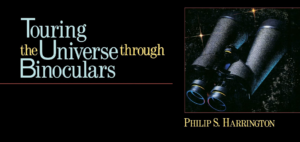
Two Eyes are Better than One
Philip S. Harrington, FRAS
Astronomy Author/Educator
Contributing editor, Astronomy magazine
Sunday, January 9, 2022
7:30 PM to 9:00 PM EST
Online event
Monthly Meeting – Public Invited
Abstract:
Binoculars are NOT just for beginners, as this talk will stress. After various binocular-related terms are defined, Phil Harrington will offer consumer tips to help the audience weed out astronomically worthy binoculars from a vast ocean of models currently available.
Bio:
A lifelong amateur astronomer, Phil Harrington was bitten by the “astronomical bug” when he was assigned to watch the total lunar eclipse of April 1968 as a homework assignment. Since then, Phil has spent countless hours touring the universe through telescopes and binoculars. He is a former staff member of New York City’s Hayden Planetarium and instructor at the Vanderbilt Planetarium in Centerport, New York. Phil is an adjunct professor at Suffolk County Community College, Selden, New York, where he teaches courses in stellar and planetary astronomy. He is a founding member of the Westport (CT) Astronomical Society and is also one of the coordinators of the annual Astronomer’s Conjunction, held every summer in Northfield, MA. Phil is also a contributing editor for Astronomy magazine, where he has published more than 200 articles since 1988.
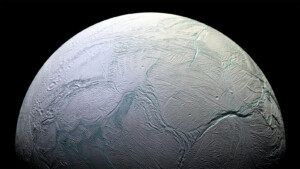
Wild and Wonderful Space Volcanoes!
Caitlin Ahrens, Ph.D.
Sunday, February 20, 2022
7:30 PM to 9:00 PM EST
Online event
Monthly Meeting – Public Invited
Abstract:
How are there many different types of volcanoes in our Solar System? How do these volcanoes form and evolve? We’ll explore the marvelous volcanic wonders of the Solar System by deep diving into how they behave and form from different planetary materials, including the mysteries of cryovolcanism!
Bio:
Caitlin Ahrens’ research involves remote sensing of icy surfaces and volatile interactions, including permanently shadowed craters at the lunar poles and cryovolcanism. Dr. Ahrens also works on several planetary geomorphology projects, including lava flow morphology, caldera formation, and rheology, on Mars, Ceres, Titan, and Pluto.
Dr. Ahrens received her B.S. in Physics/Astrophysics and Geology from West Virginia University in 2015, and a Ph.D. in Space and Planetary Science at the University of Arkansas in 2020. Dr. Ahrens is currently a NASA Postdoctoral Program Fellow at the Goddard Space Flight Center, and a member of the Diviner Science Team with the Lunar Reconnaissance Orbiter. In 2018, she was awarded the Ten Outstanding Young Americans award by the Jaycees for her efforts in science communication and outreach.
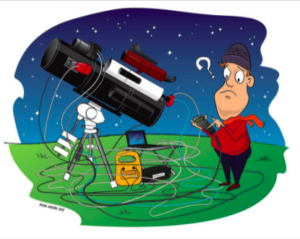
Improving the Performance of Your Imaging Mount
Eric Snow, Ph.D.
Sunday, March 13, 2022
7:30 PM to 9:00 PM EST
Online event
Monthly Meeting – Public Invited
Abstract:
In this presentation, Eric will share his experience on improving the performance of equatorial mounts, a critical and expensive component of astrophotography systems. He will start with the basics of operation and cover the common sources of tracking errors found in lower- to moderately-priced systems. Eric will then present a strategy to minimize these errors by using “hypertuning” and optimized guiding. The presentation will serve as a “How-To” guide for achieving atmospheric-seeing-limited imaging performance with less expensive mounts.
Bio:
Dr. Eric Snow recently retired from a 35-year scientific career at the Naval Research Laboratory where he served as the Director of the Institute for Nanoscience and as Head of the Physics of Electronic Materials Branch. Eric’s field of expertise is Nanoscience, which is the study and engineering of matter at the nanometer length scale. In retirement Eric has changed course and is learning about the universe at the opposite end of the length scale, the scale of light-years. In this pursuit Eric joined NOVAC and has taken up the hobby of astrophotography.
RSVP here.
Members of the public are invited to view the wonders of the universe through the telescopes of NOVAC volunteers. You do not need to be a member of the club or own any astronomical equipment to attend.
Before sunset, feel free to inspect the different telescopes and other visual equipment on the field. Have a cosmic question? One of our astronomers will be happy to help you. After sunset be prepared to enjoy the wonders of the night sky!
As a reminder please ask permission from the telescope owner before using. Please monitor your children if they’re around expensive astronomical equipment. Remember, telescope mirrors are sensitive to cigarette smoke and bug spray. Pets should not be brought onto the observing field as well (unless they are service animals).
Don’t forget to dress warmly. Please check the weather forecast. For lighting, cover a flashlight in red cellophane (the darker the better). Bring along water to keep hydrated and plan on staying the entire evening or as long as the weather allows. If you’re arriving after dark, please dim your vehicle’s headlights as you approach the gravel parking lot.
More information about Great Meadow including directions and parking visit the Great Meadow Site page.
Note: This outdoor event is weather-dependent and may be cancelled because of significant cloud cover or precipitation.
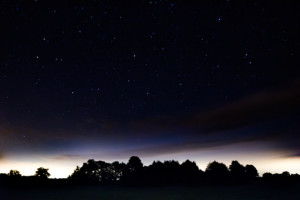
This event is CANCELED due to the cloud cover forecast tonight.
RSVP here.
Members of the public are invited to view the wonders of the universe through the telescopes of NOVAC volunteers. You do not need to be a member of the club or own any astronomical equipment to attend.
Before sunset, feel free to inspect the different telescopes and other visual equipment on the field. Have a cosmic question? One of our astronomers will be happy to help you. After sunset be prepared to enjoy the wonders of the night sky!
As a reminder please ask permission from the telescope owner before using. Please monitor your children if they’re around expensive astronomical equipment. Remember, telescope mirrors are sensitive to cigarette smoke and bug spray. Pets should not be brought onto the observing field as well (unless they are service animals).
Don’t forget to dress warmly. Please check the weather forecast. For lighting, cover a flashlight in red cellophane (the darker the better). Bring along water to keep hydrated and plan on staying the entire evening or as long as the weather allows. If you’re arriving after dark, please dim your vehicle’s headlights as you approach the gravel parking lot.
Note: This outdoor event is weather-dependent and may be cancelled because of significant cloud cover or precipitation.
Please read the C.M. Crockett Page for park details.
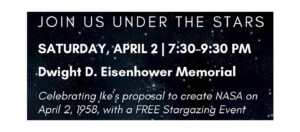
RSVP here.
Members of the public are invited to view the night sky through telescopes and participate in hands-on activities provided by the Northern Virginia Astronomy Club (NOVAC), the National Capital Astronomers, NASA Goddard Space Flight Center Astronomy Club, Smithsonian National Air and Space Museum, and the Montgomery College Planetarium.
The event will honor President Eisenhower who sent a note to Congress on April 2, 1958 requesting the formation of a civil space agency, NASA. The Trust for the National Mall and Hofstra University will co-host the event.
Don’t forget to dress warmly. Please check the weather forecast.
Note: This outdoor event is weather-dependent and may be cancelled because of significant cloud cover or precipitation.
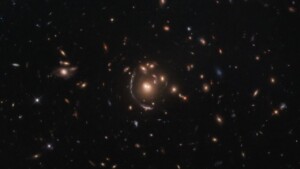
How to Measure Velocities of Distant Galaxy Clusters, and Why
Arthur Kosowsky, Ph.D.
Sunday, April 12, 2022
7:30 PM to 9:00 PM EST
Online event
Monthly Meeting – Public Invited
Abstract:
Galaxy clusters are the most massive gravitationally bound objects in the universe. Their hot ionized gas scatters photons of the cosmic microwave background, creating a microwave spectrum distortion (called the Thermal Sunyaev-Zeldovich Effect) which recent experiments have used to identify thousands of clusters. Velocities of these clusters with respect to the cosmic rest frame can be probed using a related hot-gas scattering effect (the Kinematic Sunyaev-Zeldovich Effect) or a subtle gravitational lensing effect (the transverse lensing effect). I will describe these effects and their detection prospects in upcoming cosmic microwave background experiments. Velocities of galaxy clusters reflect the growth of structure in the universe, and so provide one route to probing whether the accelerating expansion of the universe is due to some mysterious dark energy or to a modification of general relativity on cosmological scales.
Bio:
Arthur Kosowsky is Professor and Chair of Physics and Astronomy at the University of Pittsburgh. He received his Ph.D. from the University of Chicago in 1994 and spent three years as a Junior Fellow at Harvard University before taking a faculty job at Rutgers University. He moved to Pittsburgh in 2005. Major research interests have included the cosmic microwave background radiation, properties of the universe, and gravitational waves. Kosowsky was a founding member of the Atacama Cosmology Telescope collaboration and the Simons Observatory collaboration.
RSVP here.
Members of the public are invited to view the wonders of the universe through the telescopes of NOVAC volunteers. You do not need to be a member of the club or own any astronomical equipment to attend.
Before sunset, feel free to inspect the different telescopes and other visual equipment on the field. Have a cosmic question? One of our astronomers will be happy to help you. After sunset be prepared to enjoy the wonders of the night sky!
As a reminder please ask permission from the telescope owner before using. Please monitor your children if they’re around expensive astronomical equipment. Remember, telescope mirrors are sensitive to cigarette smoke and bug spray. Pets should not be brought onto the observing field as well (unless they are service animals).
Don’t forget to dress warmly. Please check the weather forecast. For lighting, cover a flashlight in red cellophane (the darker the better). Bring along water to keep hydrated and plan on staying the entire evening or as long as the weather allows. If you’re arriving after dark, please dim your vehicle’s headlights as you approach the gravel parking lot.
More information about Great Meadow including directions and parking visit the Great Meadow Site page.
Note: This outdoor event is weather-dependent and may be cancelled because of significant cloud cover or precipitation.
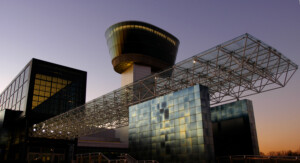
RSVP here.
Members of the public are invited to view the wonders of the universe through the telescopes of NOVAC volunteers at the Smithsonian’s Udvar-Hazy Center in Chantilly, VA. You do not need to be a member of the club or own any astronomical equipment to attend.
The event will take place on the bus parking lot of the museum. Please park your vehicle in the main visitors lot and follow signs to the observing site from the main entrance. As a reminder, parking after 4pm is free.
Before sunset, feel free to inspect the different telescopes and other visual equipment on the field. Have a cosmic question? One of NOVAC’s astronomers or museum staff will be happy to help you. After sunset be prepared to enjoy the wonders of the night sky!
Don’t forget to dress warmly. Please check the weather forecast. For lighting, cover a flashlight in red cellophane (the darker the better). Bring along water to keep hydrated and plan on staying the entire evening or as long as the weather allows.
Note: This outdoor event is weather-dependent and may be cancelled because of significant cloud cover or precipitation.

